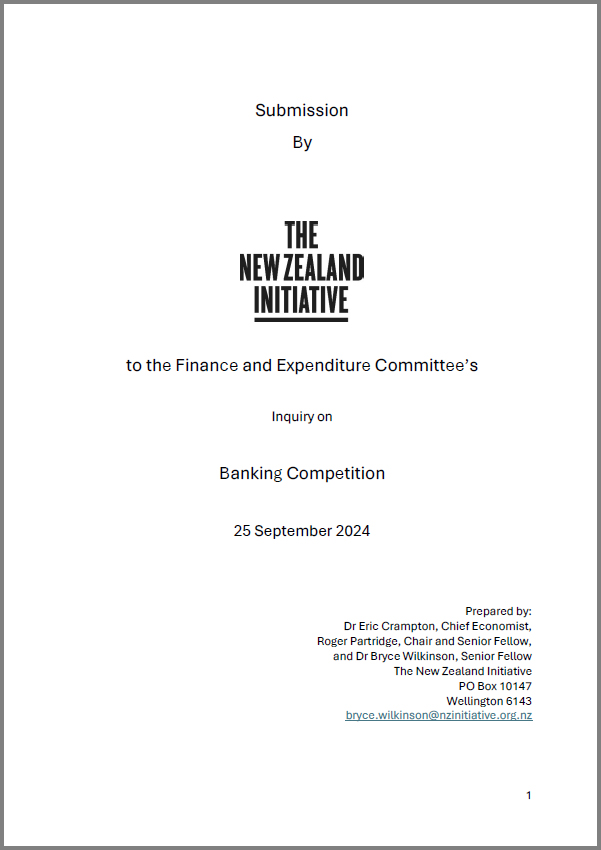1.1 This submission in response to the Finance and Expenditure Committee (FEC) Inquiry into Banking Competition (the Inquiry)1 is made by The New Zealand Initiative (the Initiative), a think tank supported primarily by major New Zealand businesses. In combination, our members employ more than 150,000 people.
1.2 The Initiative undertakes research that contributes to the development of sound public policies in New Zealand and the creation of a competitive, open and dynamic economy and a free, prosperous, fair and cohesive society.
1.3 The Initiative’s members span the breadth of the New Zealand economy, including banks and companies that use banking services. However, the views expressed in this submission are the views of the author, not those of our members.
1.4 In summary, we submit:
(a) If margins in banking are considered high, or if service to particular sectors is considered poor, and those concerns are motivating this Inquiry, the first question Parliament should ask is why a competitor has not entered or expanded its share of the relevant part of the market. If incumbent banks provide poor service to one sector and providing better services to that sector would be profitable, why has a challenger not done so and taken that part of the market? If profitability is high overall, why has a new entrant not challenged for those profits? If excess profits truly exist, or profitable opportunities for providing better services to particular sectors exist, competitors will seek to take those profits away from incumbents, because those competitors also like profits. If they have not, have regulatory or legislative barriers prevented that entry? Why would profit-seeking overseas banks not enter if profitability is as high as the government seems to believe?
(b) The purpose of all regulation, including banking regulation, should be to make the community better off than otherwise. That can occur only if the benefits regulation confers exceed the costs for those affected. This is an efficiency test. The last government dropped efficiency from the over-riding objective statement for banking regulation. That change reduces community well-being to a subsidiary consideration. The over-riding pursuit of financial stability encourages inefficient “gold-plating” financial stability regulation. This raises the cost and reduces the availability of bank credit for borrowers. It invites disintermediation. One option for restoring the primacy of net benefit would be to include a limiting phrase in the objective statement such as “to the degree that the expected benefits to the community exceed the costs”.
(c) An independent review of the RBNZ’s prudential regulatory settings, including the December 2019 decision to increase bank capital requirements, is necessary. This review should evaluate whether the benefits of current settings from greater financial system resilience outweigh the potential costs to market competition and economic efficiency.
(d) The Minister of Finance should exercise her Financial Policy Remit (FPR) powers to direct the RBNZ to implement the results of the independent review proposed above. This would provide a mechanism for addressing any harmful effects of the RBNZ’s capital decision on lending rates and the economy.
(e) To enhance the governance of prudential regulatory strategy and performance, either:
• the RBNZ’s board should be strengthened by appointing board members with prudential regulatory expertise, or
• the RBNZ’s prudential regulatory functions should be shifted to a new prudential regulatory agency as in Australia, or
• as a half-way house, the RBNZ should have a new Financial Policy Committee to govern the RBNZ’s financial stability function (mirroring the Monetary Policy Committee).
Each option would ensure that prudential regulatory strategies and performance are evaluated by a body with an expert understanding of its potential benefits and costs.
(f) Separating the executive RBNZ ‘Governor’ role from board membership would improve governance and oversight of prudential regulatory decisions. This separation is consistent with good governance practice, and is the approach taken with the RBNZ’s peer regulator, the Financial Markets Authority (FMA), with the FMA’s CEO not being a member of the FMA board. The separation would enhance the RBNZ’s board’s ability to independently assess and challenge the RBNZ’s regulatory strategy and performance.
(g) Previous studies, including the Productivity Commission’s 2014 report and our own surveys in 2017 and 2021, have consistently shown that external monitoring of regulatory agencies like the RBNZ is inadequate. Only 15.4% of respondents in our most recent survey agreed that the RBNZ was readily held to account. The newly established Ministry of Regulation should conduct periodic reviews of the RBNZ’s regulatory strategies and performance, with a focus on how prudential regulation affects banking competition and efficiency.






